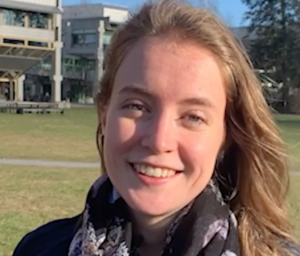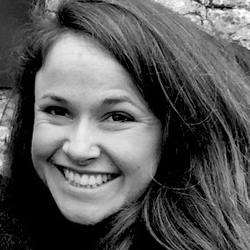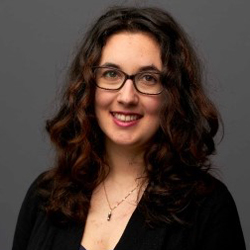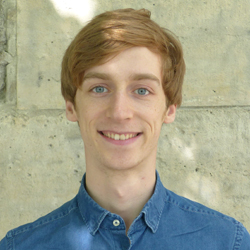Niamh Cashell
 Niamh Cashell is a PhD student on the DiCED (Digital Campaigning in Electoral Democracies) Project at the University of Manchester. Her research focuses on visual campaigning and how candidates use images on social media platforms. Her research will also explore how citizens engage in the reproduction of images online, and she is interested in the practices of meme making. Niamh’s primary research interests are the use of visuals in politics, political communication and digital campaigning.
Niamh Cashell is a PhD student on the DiCED (Digital Campaigning in Electoral Democracies) Project at the University of Manchester. Her research focuses on visual campaigning and how candidates use images on social media platforms. Her research will also explore how citizens engage in the reproduction of images online, and she is interested in the practices of meme making. Niamh’s primary research interests are the use of visuals in politics, political communication and digital campaigning.
- Contact: niamh.cashell@postgrad.manchester.ac.uk
- LinkedIn: https://www.linkedin.com/in/niamh-cashell-468766108/
- Twitter: @niamh_cashell
Sarah Ledoux
 Sarah Ledoux is a PhD student in Politics at The University of Manchester. Her thesis focuses on legislators’ policy responsiveness to citizen expression on social media. More specifically, she is interested in the contextual and institutional factors that enable online interactions, and the stages at which they influence policymaking. Her research currently draws from case studies in Brazil and Mexico. Broader research interests include online political behaviour, e-governance and AI in public policy.
Sarah Ledoux is a PhD student in Politics at The University of Manchester. Her thesis focuses on legislators’ policy responsiveness to citizen expression on social media. More specifically, she is interested in the contextual and institutional factors that enable online interactions, and the stages at which they influence policymaking. Her research currently draws from case studies in Brazil and Mexico. Broader research interests include online political behaviour, e-governance and AI in public policy.
- Contact: sarah.ledoux@manchester.ac.uk
- LinkedIn: https://www.linkedin.com/in/sarah-ledoux-phd/
- Twitter: @SarahLedx
Charley Weatherill

Charlotte Weatherill is an ESRC funded PhD student in the Politics department at the University of Manchester. Her research explores the concept of vulnerability in climate change politics. Charlotte specialises in environmental and climate change politics, and is interested in theories of feminism, anti/postcolonialism and racial capitalism
- Contact: charlotte.weatherill@manchester.ac.uk
- Twitter: @CharleyLancs
Cressida Arkwright

Cressida is a Doctoral Student in Politics at the University of Manchester (ESRC CASE Studentship, British Council). Her research focuses on modes of youth engagement and mobilization in Ukraine and eastern Europe, and bridges the literatures on political participation and migration.
She is interested in the social psychological processes that underpin youth engagement, and how they lead to different forms of participation – voting, protest, civic action, and migration. She also considers how critical moments of crisis and conflict interact with these social psychological processes, anticipating different drivers and forms of engagement.
Cressida was formerly a Research Associate at the Harvard University Davis Center, where she completed her MA in Eurasian Studies as a Kennedy Scholar, investigating forced displacement and conflict survival in Eastern Ukraine. She has held Research Associate and Assistant posts at Harvard Business School, the Harvard Weatherhead Center for International Affairs, and the Center for Eastern European Studies (ZOiS, Mobilise Project), and conducted extensive research into the Rohingya refugee crisis for Médecins Sans Frontières. She received her BA from the University of Cambridge.
- Contact: cressida.arkwright@manchester.ac.uk
Marion Greziller
 Marion Greziller is currently a PhD researcher in Politics at The University of Manchester. Her research explores the practices of gender expertise within the structures of Common Security and Defence Policy of the European Union (EU CSDP). The project pays particular attention to EU CSDP missions, with a focus on EULEX Kosovo and EUMM Georgia. More broadly, research interests lie at the intersection between gender, security, EU studies using practice and feminist institutionalist approaches
Marion Greziller is currently a PhD researcher in Politics at The University of Manchester. Her research explores the practices of gender expertise within the structures of Common Security and Defence Policy of the European Union (EU CSDP). The project pays particular attention to EU CSDP missions, with a focus on EULEX Kosovo and EUMM Georgia. More broadly, research interests lie at the intersection between gender, security, EU studies using practice and feminist institutionalist approaches
- Contact: marion.greziller@postgrad.manchester.ac.uk
- LinkedIn:www.linkedin.com/in/marion-greziller-6238ab1
- Twitter:@mariongreziller
Matthew Wray Perry
 Matthew Perry is a current PhD student in Political Philosophy at The University of Manchester. He is funded on an ESRC 1+3 studentship. His research seeks to explain the possession of so-called “Human” rights through interrogating the idea often established at their foundation: dignity. He is interested in how we understand our mutual obligations in light of the novel perspectives a fuller non-speciesist understanding of dignity might give rise to. He is also interested in animal ethics, contemporary theories of justice and the relation between ideal theory and “real” politics.
Matthew Perry is a current PhD student in Political Philosophy at The University of Manchester. He is funded on an ESRC 1+3 studentship. His research seeks to explain the possession of so-called “Human” rights through interrogating the idea often established at their foundation: dignity. He is interested in how we understand our mutual obligations in light of the novel perspectives a fuller non-speciesist understanding of dignity might give rise to. He is also interested in animal ethics, contemporary theories of justice and the relation between ideal theory and “real” politics.
- Contact: matthew.perry@manchester.ac.uk
- LinkedIn: www.linkedin.com/in/matthew-perry95
- Twitter: @MW_Perry
Dr Joanna Flavell
Joanna holds a PhD is in Environmental Politics, from The University of Manchester, where she currently holds the position of Lecturer in Global Politics. Her work, broadly speaking, focuses on feminist analyses of, and feminist approaches to global climate politics. Her doctoral thesis examines the political strategies (rhetorical and procedural) of the Women and Gender Constituency (WGC) in the United Nations Framework Convention on Climate Change (UNFCCC) through a framework of Ecofeminist Intersectionality.
Her PhD investigates a central debate in feminist literature on global climate politics regarding how feminists can maintain a theoretical commitment to intersectional feminism while pursuing collective political projects in spaces of global governance such as the UNFCCC. In doing so it offers a, previously untold, history of the UNFCCC that foregrounds gender and feminist organising in a timeline that provides a useful resource for those writing about feminist climate activism, as well as highlighting the importance of that activism in shaping narratives of global climate politics.
Dr Andrew Barclay
Andrew is a Research Associate at the University of Sheffield, having completed his PhD at The University of Manchester in 2020. His research to date has examined elections and voting behaviour in Britain, with a particular focus on ethnic, religious and sexual minority voters.
He is currently working on a NORFACE funded project which explores how election campaigns are increasingly becoming ‘data-driven’, and the implications that these developments have for parties, voters and democracy more broadly.
Dr Simon Chin-Yee
Simon is a research associate in the Department of War Studies at King’s College London and a teaching fellow in the School of Public Policy at University College London. His research interests focus on African politics, climate change policy formulation and issues surrounding human security and vulnerable populations.
Simon attained his PhD in Politics from The University of Manchester. Entitled ‘Defining policy: Drivers of climate change policy in Kenya’, his thesis was based on extensive training in international political economy and is a thorough climate policy analysis on three levels: international, regional and national.
In addition to his role in academia, Simon has fifteen years of experience in international cooperation and policy having worked extensively with the United Nations and policy projects. For the academic year 2019/2020, Simon’s teaching focuses on Global Environmental Politics, International Public Policy and the Political Economy of Development at UCL.
- Academic profile: www.kci.ac.uk/simon-chin-yee
- Twitter: @SimonChinYee
Dr Tomas Maltby
Tomas is a Lecturer in International Politics, and the Education Director for the Department of Political Economy. He works primarily on issues related to EU politics and energy policy.
Tomas completed his BA in International Relations at Leicester University before moving to Sheffield University to undertake an MA in Research Methods in Politics and International Relations. He did his PhD at The University of Manchester and worked as a Research Associate there before starting work at King’s College London in September 2014.
Tomas has also taught at the Institute of European Studies, part of the Vrije Universiteit Brussel.
Tomas’ research focuses primarily on climate and energy policy. His research considers understandings of security in the development of climate and energy policy at the European and nation state level. This includes work related to energy transitions, the securitisation of energy, climate scepticism and also work on the politics of air pollution.
Current editors (2022-2023)
Find out more about the current editors of Political Perspectives.
